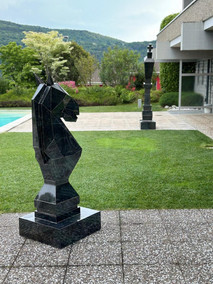Jetmir’s Chess: A Metaphor of Our Life and Times
- JetArt Gallery
- Sep 20, 2024
- 3 min read

*And then his words ceased,
no differently than metal disintegrates
as it boils, and the sparks fly off in rings.
His fire followed every spark;
and they were so numerous that their count
is more than the doubling of chess squares.
I heard Hosanna sung from choir to choir
towards the fixed point that holds them in place,
and will hold them forever, just as they’ve always been.*
(Dante, *Divine Comedy, Paradiso*, Canto XXVIII, 88-96)
---
That Dante refers to the game of chess in discussing the number of Angels—then a hotly debated topic—is no accident. The comparison he uses is highly meaningful: the expression *s'immilia* (multiply by a thousand) is directly inspired by the legend in which the inventor of chess asked the King of Persia, as a reward for his invention, to place a single grain of wheat on the first square of the chessboard, doubling it with each subsequent square. Before we dive into this “window” of infinity, let’s mention the most widely accepted theory that chess was invented in either Persia or India. Ancient Persian poems from the 6th–7th century AD describe an old board game called *Shatranj*, which was derived from an even older Indian game known as *Chaturanga*. Both of these games are very similar to modern chess.
Returning to the idea of infinity: the story goes that the Shah of Persia asked the mathematician Sissa Nassir to invent a new pastime to help distract him from the grief of his son’s death. The result was chess. The Shah became so obsessed with the game that he invited the mathematician to ask for whatever reward he desired. Nassir’s seemingly simple request was: “Oh King of Kings, take the chessboard I’ve given you and place one grain of wheat on the first square, two on the second, four on the third, eight on the fourth, and continue doubling until you reach the sixty-fourth square. Put all the grains into a sack and give them to me.” What initially seemed like a modest request soon turned out to be impossible to fulfill. After two weeks of calculations, the royal accountants realized there wasn’t enough grain in all the granaries of the kingdom to meet Nassir’s demand. This is why Dante references chess when speaking about the number of Angels, and perhaps also why, in more recent times, a great director like Ingmar Bergman used chess as a metaphor for human existence in his film *The Seventh Seal*. In the film, the crusader Antonius Block plays chess against Death. After all, in life, the game and reality are inextricably intertwined—a concept masterfully explained in Ludwig Wittgenstein’s *Philosophical Investigations*: “Compare the game of chess with that of tic-tac-toe. Is there always a win and a loss, or a competition between players?”
---
But let’s move on to Jetmir’s chess pieces. These are not merely three-dimensional representations of chess pieces, crafted in one style or another. They are twisted, deformed, bent off their axis, sometimes eroded—but always with a certain logic. The King and Queen, due to their height and importance, are the most affected by these distortions and deformations. At times, they seem on the verge of losing their balance. The rooks, bishops, and knights are similarly afflicted by various deformities. The pawns, being shorter, do not suffer these distortions. Instead, they appear “hollowed out,” almost “eaten away” at their spherical tops, yet they never lose the central axis of their balance. Just as in life, and the systemic crisis that engulfs our era, the higher you rise, the greater the compromises, distortions, and irreconcilable contradictions that those in power—or those who manage some form of authority—must bear. This burden, when it becomes unbearable, ends up deforming those who, by accepting the role of standard-bearer, implicitly agree to lose their balance. Such a fate does not befall the pawns. They are too humble, too low, too devoid of the kind of power that distorts and twists, stripping its bearers of their equilibrium. In the end, the pawn remains balanced, humble, and, perhaps for that reason, firmly planted on the ground. The pawn may be corroded, damaged, or “eaten away” by the hardships of existence or the arbitrary nature of the power it must endure, but it stands upright on its core axis.
The metaphor for our time doesn’t end there. The chess pieces combine in various configurations, creating formations rich in meaning. For example, they can be arranged into a “Last Supper” reminiscent of Leonardo da Vinci, or they might cluster together in symbolic allegories. As Bobby Fischer once said, “Chess is life.” The chessboard is our world, the game is its unfolding, much like the passage of time in each person’s life, dictated by the moves we make in the great game of our destiny.

.png)


































Comments